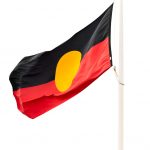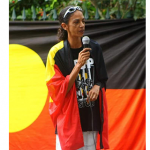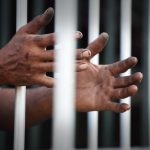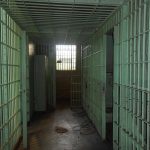John Pat’s Death in Custody: The Impetus for the Royal Commission
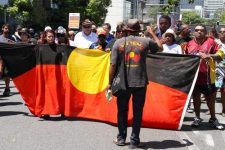
As Ashley James went to make a purchase at the bottle shop of the Victoria Hotel in Roebourne WA on 28 September 1983, a barmaid heard one of five off-duty police officers, who’d all been drinking heavily, snarl at the young local Aboriginal man, “We’ll get you, you black cunt.”
Situated on the lands of the Ngarluma people, the Pilbara Region town was notorious for its saturation policing. And it was out the front of the town’s cultural hub, the pub, that Ashley fought back, after one officer told him to “get fucked” and assaulted him. And then all five officers set upon him.
As the story goes, several Aboriginal onlookers intervened in support of Mr James, one of which was 16-year-old John Pat. A witness saw one officer strike Mr Pat in the face. This sent the youth falling backwards and he struck his head on the road.
According to another witness, an officer went over to Pat and kicked him in the head, as he was lying on the ground. Then the Yindjibarndi youth was dragged over to the waiting police wagon, kicked in the head once more, and thrown in the back “like a dead kangaroo”.
On arrival at the Roebourne police station, people from across the road witnessed the officers drag Pat and several other Aboriginal men from the van to the pathway and systematically beat each of them. And when officers checked on Pat in the juvenile cell about an hour later, he was dead.
Acquitted by an all-white jury
A subsequent autopsy revealed Mr Pat had suffered several severe blows to the head, which caused a fractured skull, haemorrhaging and tearing of the brain. There was a large bruise at the back of his head and six on the right side of it. The young man also had a torn aorta and two broken ribs.
On 30 October 1983, the inquest into John Pat’s death commenced. The five police refused to give evidence, but they submitted statements denying that they’d used excessive force on the night the incident took place.
The inquest ran for twenty one days and heard from seventy witnesses. Unsurprisingly, the official police version differed from the accounts given by others. One officer said that Pat had walked from the van to police lockup, however a medical expert said this wasn’t possible considering his injuries.
Following the inquest, the four white officers and one Aboriginal police aide stood trial charged with manslaughter in the WA Supreme Court before an all-white jury. Each of the men swore that they were innocent, and claimed that their co-accused were innocent as well.
The jury retired at 12.15 pm on 24 May 1986. And at 7.15 that evening, it returned to deliver its verdict, finding all the accused not guilty. And the five police officers were reinstated to duty following the outcome of the trial.
The government inquiry
The officers’ acquittal led to widespread outrage and sparked a long-term campaign calling for an investigation into the deaths of First Nations peoples whilst being detained. The Hawke government announced the Royal Commission into Aboriginal Deaths in Custody on 10 August 1987.
The Royal Commission investigated the deaths of 99 Indigenous people in custody around the country over a 10 year period, including the death of John Pat. It tabled its final report on 15 April 1991, with a list of 339 recommendations, most of which have never been acted upon.
Key recommendations included number 87, which states that people should only be arrested “when no other way exists for dealing with a problem”, while the 92nd recommendation says that, “imprisonment should be utilised only as a sanction of last resort”.
However, 28 years on, the percentage of the adult prisoner population comprised of Aboriginal and Torres Strait Islander people has almost doubled from the 14 percent it was in 1991 to 27.5 percent of the incarcerated populace in June last year.
Deaths inside continue
Indeed, the Guardian reported last August that since the time the Royal Commission released its final report at least 407 Indigenous people have died in Australian correctional facilities and police lockups, with 147 of these having occurred during the last ten years.
Over the last four years, ten First Nations people have died in custody in NSW. The coronial inquiry into the 2015 death of David Dungay came to an end last week. It was heard that the Dunghutti man cried out he couldn’t breathe a dozen times while corrective services officers held him down.
On the final day of the inquest, Corrective Services NSW assistant commissioner Kevin Corcoran admitted there were organisational failures in the lead up to the tragedy. And due to these failings, he apologised to the family for David’s death.
Meanwhile, the inquest into the death of Rebecca Maher continues. The 36-year-old Wiradjuri woman was placed in Maitland police lockup at 1 am on 19 July 2016, after being found on the side of the road in an intoxicated state. She was subsequently found dead in the cell at 6 am.
Emergency care specialist Dr John Vine told the inquiry that police failed in their duty of care as they did not check on the unconscious woman during the five hours prior to her being found dead. The officer in charge at the time said he considered calling an ambulance, but failed to do so.
An apology, but no justice
In 2013, on the 30th anniversary of John Pat’s death, the WA parliament issued an unreserved apology to his family. However, Maisie Pat, John’s younger sister, made clear she’d rather have seen the officers responsible serve time, as they were the ones that needed to apologise.
Marc Newhouse from the WA Death in Custody Watch Committee told the ABC that since Pat’s death the situation had become worse, as there were more Aboriginal people dying in custody in 2013, and he drew a correlation with the growing numbers of First Nations people being imprisoned.
Ms Pat was only 14 when she learnt of her brother’s death. She said at the time the apology was issued that, “There’s no justice for my people and all people of today. My brother’s life was taken, it only seems like yesterday it was taken from me and I still wish I had my big brother here today.”


